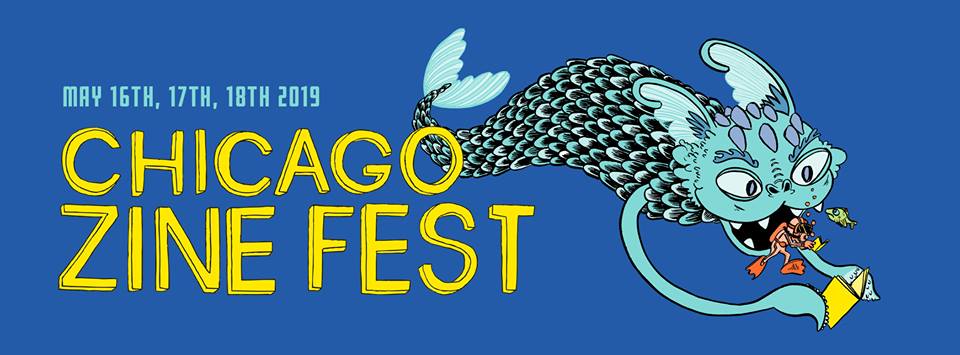The fabulous Chicago Zine Fest’s 10-year anniversary is this year, and CZF is celebrating with a jam-packed three-day festival on May 16-18. With workshops, panel discussions, events, and a giant 250+ vendor exhibition, CZF strives to showcase the culture and accessibility of zine making. We chatted with Johnny Misfit, who’s been with CZF since the beginning, to find out more about what makes this festival tick.
How did Chicago Zine Fest start out?
The first festival was March 2010. Four friends began the fest with modest roots that grew into one of the largest fests in the U.S. Here are the first 4 organizers:

It’s the 10th anniversary of CZF, congratulations! What are you doing differently this fest to celebrate?
This year we’ve expanded the fest to 3 days, adding in Thursday night programming. Our normal Friday programming will include our annual exhibitor zine reading, but adding in Zine Jeopardy as a fun late night event. This year we continue to work with youth orgs and school students tabling at the fest. We held a zine fest poster design contest with Chicago Public School students. We’ve added new sponsors, hosting in new venues and welcoming new guests. We tried to go big for the anniversary.
CZF seems to only have exploded and grown larger since its inception in 2010. Did you predict this when you started out?
I’ve been part of the festival each of the ten years, organizing for 9 of them. There hasn’t been any overt push to grow and get bigger. We react to our community and respond in kind. If there wasn’t a need, we’d respond and react accordingly. It’s been great to see how far things have come in one decade. I sincerely hope momentum keeps up for many more.
Any secrets to the event’s success?
Don’t do it.
What role has the Chicago Zine community played over the years in relation to the event?
It’s tough to organize a festival without community support. Each year we do need more and more people to help organize their time as we are an all unpaid volunteer staff. We listen to our community and provide a festival we feel represents it. Without community support we wouldn’t be able to do that. So it’s thanks to self-publishers that Chicago Zine Fest is the festival we’ve become.
 Can you tell us a little bit about the Zines and Social Justice Panel, as well as the other panels that will be happening throughout the weekend?
Can you tell us a little bit about the Zines and Social Justice Panel, as well as the other panels that will be happening throughout the weekend?
The Thursday panel was a labor of love for our organizer Cynthia Hanifin. She’s a social worker and really worked hard to coordinate this panel. We’re lucky to be working with a great partner in DePaul University’s Special Collection and Archive staff. They are hosting an exhibit of work that showcases protest art that coincides with the fest (make sure to come early to check that out). The panel will showcase a number of diverse voices, backgrounds, and experiences. We hoped to get as many perspectives represented as possible to really dive into the topic of zines and social justice.
And that’s only the first day of the fest. Friday we’re excited to have a zinester reading at Quimby’s Bookstore, the heart of zines in Chicago. We’re looking forward to have fun testing zine knowledge at a round of Zine Jeopardy. On Saturday at the fest we’re holding a variety of hands-on activities led by local community organizations. And our workshops will continue to showcase diverse voices and backgrounds with programming, including a panel led by Anna Vo and a panel exploring new and emerging trans voices in Chicago. There’s going to be a lot to attend and digest over the weekend. Not a bad way to host our 10th fest.
How do you go about creating your programming for workshops and panel discussions?
We’ve had a lot of approaches to programming over the years. Being all organizers who volunteer our time to zine fest, it’s a big task to coordinate about a dozen programs, workshops, readings, and special events. Each year during the planning stages, we always consider who is active in our community, new faces to work with, celebrating diverse voices and new ideas we haven’t presented before. That list gets smaller once we do some research on our ideas and figure what would be a great program that people would be interested in. Then it’s a task to coordinate with guests and individuals to wrap it all together.
What’s always your favourite part of the CZF weekend?
Sunday morning when it’s all over.

